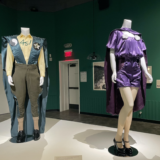 I enjoy a well told military science fiction story and when the author is a veteran, I know the details will ring particularly true and authentic, as with Michael Mammay and his recently released novel Planetside. The book combines military action, interstellar politics and a mystery that keeps growing bigger and more intricate as the book progresses. Needless to say I read it in one long session and stayed up too late to do so! I was excited to have a chance to interview Michael about the book.
I enjoy a well told military science fiction story and when the author is a veteran, I know the details will ring particularly true and authentic, as with Michael Mammay and his recently released novel Planetside. The book combines military action, interstellar politics and a mystery that keeps growing bigger and more intricate as the book progresses. Needless to say I read it in one long session and stayed up too late to do so! I was excited to have a chance to interview Michael about the book.
A little about the author, from his official biography: “Michael Mammay is a retired army officer and a graduate of the United States Military Academy. He has a master’s degree in military history, and he is a veteran of Desert Storm, Somalia, and the wars in Iraq and Afghanistan.”
The blurb (courtesy of HarperCollins): A seasoned military officer uncovers a deadly conspiracy on a distant, war-torn planet…
War heroes aren’t usually called out of semi-retirement and sent to the far reaches of the galaxy for a routine investigation. So when Colonel Carl Butler answers the call from an old and powerful friend, he knows it’s something big—and he’s not being told the whole story. A high councilor’s son has gone MIA out of Cappa Base, the space station orbiting a battle-ravaged planet. The young lieutenant had been wounded and evacuated—but there’s no record of him having ever arrived at hospital command.
The colonel quickly finds Cappa Base to be a labyrinth of dead ends and sabotage: the hospital commander stonewalls him, the Special Ops leader won’t come off the planet, witnesses go missing, radar data disappears, and that’s before he encounters the alien enemy. Butler has no choice but to drop down onto a hostile planet—because someone is using the war zone as a cover. The answers are there—Butler just has to make it back alive…
Veronica for Amazing Stories: What were your three major influences when writing the book?
Michael: This is a pretty complicated question, because I’ve been a reader for a long time. Certainly for this book, Gone Girl, by Gyllian Flynn was a huge influence. I was reading that and it has this wonderful, voicey first person narrator that just punches you in the face. I’d been writing in third person, but when I read that, I knew I had to tell this story in first person. Elizabeth Moon, who is a veteran like me, was a big early influence. I look back to her Paksenarrion series as one of the reasons I wanted to write SFF. I got a congratulations tweet from Moon when my book published (we share an agency) and it was one of those things that…well it was probably nothing to her, but it meant a lot to me. I guess the thing that got me into military SF in the first place was probably Starship Troopers. So while that probably wasn’t a direct influence, it fueled my love for the genre. Halderman is definitely an influence. So…that’s four, not three. But I don’t know that I could answer with three. If you gave me ten, I’d fill them all up. Scalzi, Campbell. Obviously there’s some Joseph Conrad in Planetside.
ASM.: Excellent influences all right! While of course I thought the central character of Carl Butler was intriguing and I resonated with his challenges and solutions to those problems, I appreciated that you had a number of strong female secondary characters. I was especially impressed with Lt. Baxter. What made you decide to write her into that sequence of events?
M.M.: What a great question. First, thank you. I tried really hard to write good female characters. Some of the thanks for that goes to one of my critique partners, Morgan (Red) Levine, who helped me see that I should change some of my characters from male to female in an early draft. I flipped Alenda and a couple other characters. Baxter, though…she was always a woman. When I started writing Planetside I knew I was creating a military environment with a ton of problems. It’s got command issues, people with their own agendas, tons of politics…so I decided that I was going to give the society one or two things that they were good at. Areas where they got it right. They had enough problems, so I figured I’d have them do a good job with gender issues. Butler, the main character, doesn’t care if you’re a man or a woman. He cares if you get the job done. I think that’s one of the endearing things about him (at least I hope it is.) At the same time, Butler has an issue where he tends to try to protect younger women (for reasons that I’m not going to discuss here, because spoilers.) With Baxter, I wanted him to do better. She’s this young lieutenant, and for the most part, he gets out of her way and lets her do her job. And I think because they were in combat most of the time, that was easier for him than it is when he’s back on the base. He’s overprotective of Alenda. So part of Baxter’s role was showing that dichotomy. Also, not going to lie, I just wanted to write a kick ass black woman leading troops in combat in case anyone ever makes this into a movie.
ASM.: No argument from me – Lt. Baxter rocks and could have her own book! Changing topics a bit, I appreciated that you mentioned Butler’s wife more than once and his concern for her. Anything in general terms you’d like to share with the civilian world about the role of the military spouse today in supporting the warfighter?
M.M.: Goodness, you’re asking the complex questions! I could write a book on this. I’m not going to. The role of people at home, and of spouses in particular, is the link that it provides the soldier back to civilization. I mean, spouses do so much. Personally I spent about six years deployed. That’s six years where my wife was raising our kids by herself, taking care of the house, doing everything that two parents would normally do. How do you even begin to talk about the immensity of that? But in the book, Butler’s wife is more of a link to his humanity. He’s out in this military situation pretty much alone, so she’s his lifeline back to the real world. I feel like I did a poor job here explaining this. It’s complicated.
ASM.: I totally get the explanation and I thought his concern for his wife, in the midst of everything going on in Planetside did serve an important purpose to show us other aspects of him as a total person. What distracts you when you write?
M.M.: Twitter.
ASM.: I hear you – I spend way too much time on twitter for sure. Is there one thing TV and the movies ‘get wrong’ about the military? Or one crucial thing you feel civilians might not realize about the soldiers who defend them?
M.M.: One thing? That’s tough. There are a lot. If I have to pick one, I think it’s the idea that soldiers are rigid in their thinking. The army officers I worked with—and I worked with a lot—were intelligent, flexible thinkers who looked for innovative ways to solve problems. Whenever I see a two-dimensional military character who doesn’t think outside the box, I cringe.
ASM.: Excellent point re the need for flexible thinking, which your characters are certainly required to display in the course of the novel. Is there a TV show you’ve recently binge watched?
M.M.: My wife and I are really into ‘The 100’ right now. It hasn’t always been great, but this season is superb. The characters are so complex. You’ve got characters making bad decisions, but for good reasons. Like Clarke really does some messed up stuff, but it’s to protect her adopted daughter, which is totally believable. You question Octavia’s methods, but the things she’s done—she’s taken on the burden of leadership, bearing the guilt of necessary decisions for her society to survive. And that’s affected her, because of course it has. It’s just really great storytelling.
ASM.: Speaking of storytelling and craft, what do you do if you get ‘stuck’ while writing a scene in a new book?
M.M.: Write something. Anything. It doesn’t matter how bad it is. If I start writing—force it—then the words will come. I may delete them, but it gets me moving again.
ASM.: What inspired you to write science fiction versus modern day military fiction? What was the appeal of making it SF?
M.M.: I wanted to write military characters, but I wanted the freedom to break from reality when I needed to. Science fiction gave me the ability to do that. Why soldiers do what they do was more important to me than how they do it.
ASM.: I note in your twitter bio it says “Useful in a zombie apocalypse.” What would your first 3 priorities be if such an event started tonight?
M.M.: You want me to give away my zombie survival secrets, thus making me less useful in that apocalypse? That doesn’t seem very smart. I’ll give you a short version: Find your tribe, secure a water source, be disciplined.
ASM.: Hmmm (checks apocalypse survival list), water…What’s next for you? Is there to be a sequel for Carl Butler?
M.M.: Colonel Butler will return in 2019. The sequel (which doesn’t have a title yet) starts a couple years after the end of Planetside.
ASM.: I’ll definitely be waiting for that one with high anticipation. What’s on your To Be Read List?
M.M.: Recently I really enjoyed City of Lies by Sam Hawke and Age of Assassins by RJ Barker. Next up I’m reading The Accidental War by Walter Jon Williams and The Disasters by MK England. Both of those are available later this year. Little known fact: one of the best parts of being an author is that people send you books before they are published. True story.
ASM.: Yes, those Advance Review Copies are always nice to see in the inbox. (Although it should be noted I bought my copy of Planetside.) And a final, fun question: What would your ‘perfect day’ look like?
M.M.: On the beach, under an umbrella with my wife. Both of us have books to read (though not the same one.) There’s drink service.
For more about Michael and his books, visit https://www.michaelmammay.com/
USA Today Best Selling Author Veronica Scott usually covers science fiction romance for Amazing Stories, when she isn’t writing SFR novels herself. She was raised on a diet of science fiction classics, however, and may interview SF&F authors in this space from time to time.










